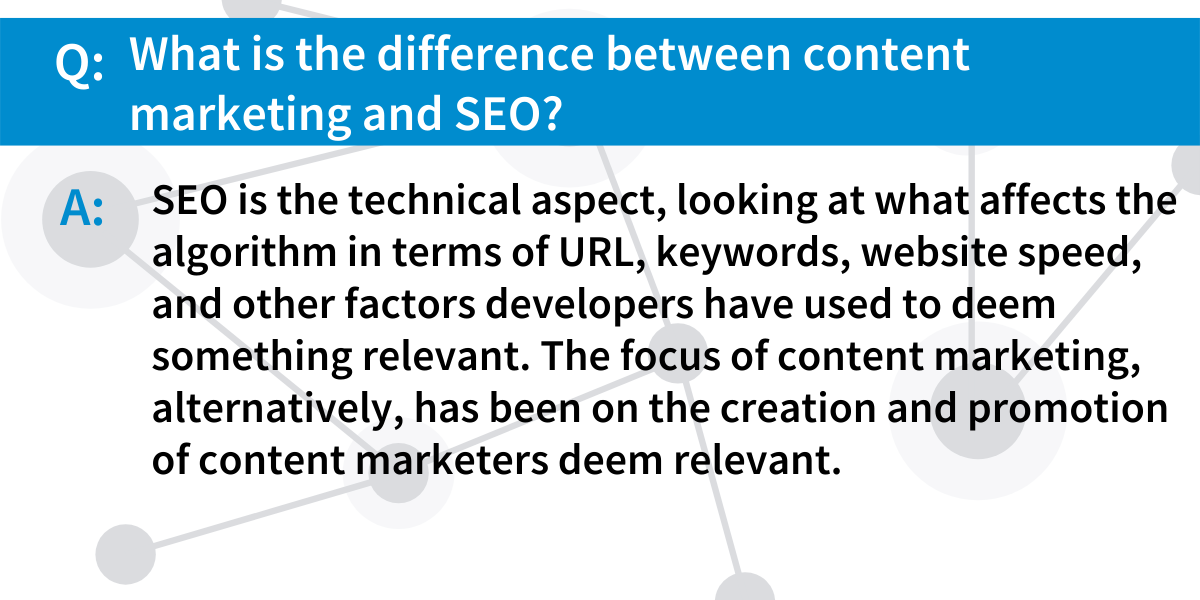How to Use Content Marketing for SEO: Creating Content That Ranks
May 19, 2021 •DJ Team

Achieving SEO relevance through content marketing means you’ve succeeded in two ways. One, you’ve accomplished a marketing goal that will likely create new leads and grow sales. And, two, you’ve established worth with your audience—they value what your brand is saying. The second form of success is integral to a long-term relationship with your audience, and you should start with this as a goalpost as you develop an SEO content marketing strategy. Create content that’s useful to your audience, and SEO will follow.
So if that’s the case and good content will positively affect SEO, what even is the difference between content marketing and SEO?
Traditionally, SEO is the technical aspect, looking at what affects the algorithm in terms of URL, keywords, website speed, and other factors developers have used to deem something relevant. The focus of content marketing, alternatively, has been on the creation and promotion of content marketers deem relevant.
The two have more in common than these definitions imply, though. We want to look at the ways SEO and content marketing overlap and affect each other.

How do you use content marketing for SEO?
The goal of SEO is for your content to reach the highest number of audience members by being prioritized on most search engines. It’s the megaphone for your brand’s voice. But what is your brand saying? SEO and content marketing share a “chicken or the egg” kind of relationship. Let’s look at some examples of this relationship.
Blogging
We generate blog content because it remains one of the best ways to communicate online with our target audience. Relevant and informative (if done right) without being too lengthy, it remains a great medium for content marketing. They’re also often the tissue for SEO—using links, keywords, and other SEO content writing tips to reach more audiences.
Social media
Of all megaphones, this can be the loudest for many brands. Social media allows us to reach audiences who didn’t even know they were looking for what our brand offers. The thing is, social media doesn’t directly affect SEO, but it can divert traffic to SEO-relevant content, improve the lifecycle of content, and boost viewership. More eyes on your blogs and other website content can translate to SEO gains if those eyes like what they see enough to stick around on your website after reading it.
Infographics, eBooks, whitepapers
More and more businesses and brands rely on these types of content to become voices of authority in their industry. The quantitative data often presented in these formats appeals to a pragmatic, no-nonsense audience that wants straightforward information. But even with this data-driven content, SEO is still relative. How fast images load, blogs that direct traffic to download whitepapers, keywords used, links in written content—all are chances to improve SEO through content marketing.
What is content marketing in SEO?
The drive behind all content marketing strategies should be to connect with target audiences. How blogs are written and what topics are included, the data we believe audiences value, the type of voice or tone we think resonates, what’s catchy, even—all of this originates from trying to identify what audiences care about.

While SEO is generally thought of as technical strategies to get prominence in search engine results, also remember that content marketing strategists are simply using SEO as another tool in their career-long attempts to connect with their audience. And SEO, at its core, is trying to identify the content audiences are most likely looking for. Again, you can see where these interests and goals overlap.
How does content impact SEO?
How we create content—and how we adapt content—can have big implications for SEO performance. And, if thinking about audience connection, a lot of the ways we improve content will directly improve SEO. As long as content creators are aware of where these overlaps exist, they can meet both criteria laterally. Look at some SEO content writing tips that are effective in both arenas:
Readability
Audiences read text differently online and on mobile than they would, say, in a newspaper, or in a book. For starters, we absorb less text on a screen. Audiences absorb shorter sentences, paragraphs, and sentence structures easier online. SEO algorithms know this, and they will favor content with shorter sentence lengths.
Keywords
With so much data available, we’ve all become expert keyword researchers. If you’re using vocabulary relevant to your industry—and content that relates to your audience—your keywords will tend to match SEO keywords. Your job is to identify them and be strategic in how you place them in meta descriptions and titles.
Links
Links help establish authority and authenticity for content writers. Audiences see you’re willing to provide as much context as possible for a given subject—to the point you’re willing to send them to a different web page. And links improve audience experience—they want to have the choice to learn more. SEO logic understands this and values content that is willing to link to additional information.
How does content help SEO?
If you’re creating content that’s helpful and relevant to your target audience, the content itself already does much of the SEO legwork. Want to create this kind of content? DemandJump can help. The platform can help develop and execute content creation that’s effective in your SEO content marketing strategy, while actually providing your audience useful information that grows your brand.
Content analytics will help you track what pieces of content are working best, how to identify SEO keywords that already exist in your text, and create additional content that supports your growth goals. Try it today to see just how easy it can be.
Featured Articles
Categories
- Attribution Tracking (13)
- Channel Optimization (11)
- Consumer Insights (68)
- Content Marketing (251)
- Data Science (8)
- Digital Marketing (6)
- Digital Transformation (26)
- Enterprise (10)
- Lead Generation (14)
- Market Intelligence (8)
- Marketing Analytics (39)
- Marketing Attribution (57)
- Marketing Management (153)
- Marketing Operations (86)
- Organic Search (222)
- Paid Search (52)
- Pillar-Based Marketing (63)
- Programmatic Advertising (9)
- SaaS Content (14)
- SaaS Marketing (29)
- Search Marketing (111)
- SEO Keyword Research (28)
- SEO Pillar (18)
- SEO Strategy (46)
- SMB (5)
- Website Content (12)


